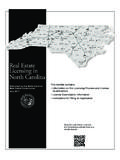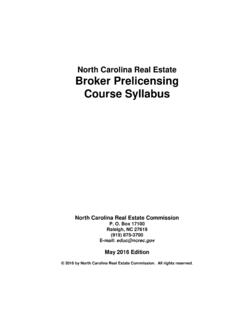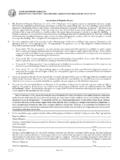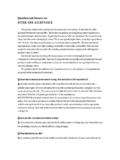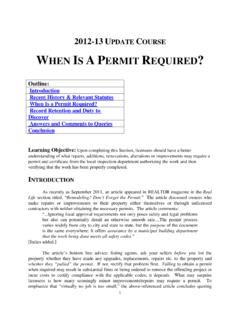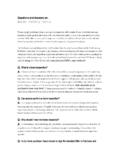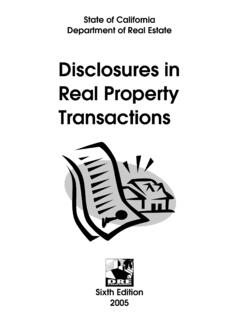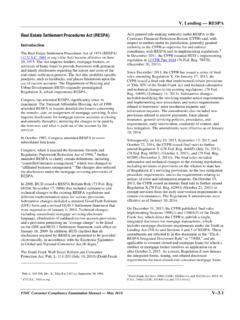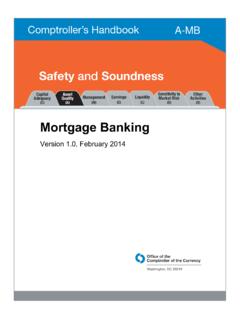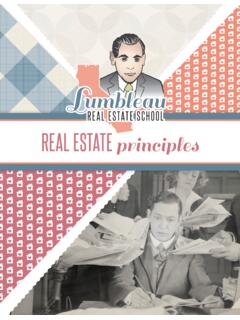Transcription of NCREC Brochure - North Carolina Real Estate Commission
1 Form summarizes all funds received and expenses paid by the , you must pay a portion of the property taxes, the cost of all inspections, and all costs associated with the loan, title search and closing. These costs include the appraisal fee, survey, pest inspection, lender fees, fees to establish an escrow balance for homeowner s insurance, taxes and any required private mortgage insurance, attorney fees, title insurance, and recording fees. The seller normally pays the balance due on any existing loans, his portion of the taxes, commissions to real Estate brokers, fees for deed preparation, cancellation of existing liens, and revenue stamps payable to the state.
2 In most transactions, payment of these fees is negotiable between the parties. However, if you are getting a VA or FHA loan, the lender may require the seller to pay particular closing costs, such as the pest : When will I receive the Closing Disclosure Statement?A: If you are using a lender to assist with the purchase of the home, by law, you must receive your Closing Disclosure three (3) business days prior to closing. The Closing Disclosure will come from your lender. Contact your lender (or loan officer) at least a week before closing to find out how you will receive your Closing Disclosure.
3 Ask whether your Closing Disclosure will be sent to you via email, postal mail, or if you will have to download it from a : May a real Estate agent sign closing documents for me?A: No, not unless you have given the agent your written authorization, preferably in the form of a limited power of attorney, to sign documents for you. However, the best policy is for you to review and sign ROLL DOUBLE CHECK ADJUSTMENTS FOR ROLL 1/16" ADJUSTMENTS FOR DOT documents yourself. If you have a question about any document you are asked to sign, ask the closing attorney for an explanation of the document before you sign : The closing attorney is asking me to remit funds via wire transfer.
4 How can I protect myself from wire transfer fraud?A: Before transferring any funds via wire transfer, contact the closing attorney s office by telephone using a publicly verified phone number and speak directly to the closing attorney or a member of his/her staff to obtain the correct wire transfer information. Do not rely upon emails, text messages, or telephone calls from persons claiming to be the closing attorney or a member of his/her staff. Such persons may be attempting to give you fraudulent wiring instructions in an effort to steal your : I am being asked to put something on the statement that is different than what I agreed to.
5 Is that ok?A: Probably not. A closing/ settlement statement or closing disclosure statement should reflect the agreement between the parties and match the terms set out in the purchase contract. You may be committing loan fraud if you make a false representation to a lender on the loan application or elsewhere in order to obtain a larger loan amount or a loan on more favorable terms than you are otherwise qualified for under the lender s settlement statement). If you are a buyer obtaining a loan, there will be loan-related documents (promissory note, deed of trust, tax forms, and other disclosures).
6 A seller will be asked to sign a deed conveying the property to the buyer. If a buyer has not already received and reviewed copies of the termite report, survey and repair invoice(s), he/she should do that at the : What is a closing disclosure?A: A closing or settlement statement is a document that summarizes all funds received by you and the seller at closing, and all funds paid by you and the seller for various expenses of the transaction ( real Estate broker commissions, loan payoffs, fees for inspections, property taxes, etc.). For all closings involving federally insured loans, the real Estate settlement procedures Act (RESPA) requires that this information be disclosed on a Seller Disclosure or a Buyer Disclosure form for each Closing Disclosure is a form created by the Consumer Finance Protection Bureau (CFPB) that is required for all federally insured loans.
7 There are two Closing Disclosure forms: a Buyer/Borrower Disclosure form and a Seller Disclosure form. The Buyer/Borrower form summarizes all funds received and expenses paid on your behalf. It also contains information regarding your loan, such as the interest rate and the lending institution. The Seller Disclosure guidelines. Loan fraud is a federal crime punishable by up to 30 years in prison and $1 million in fines. If you are asked to do any of the following, refuse and immediately contact the North Carolina real Estate Commission : create a false gift letter for down payment funds. make it appear you made a deposit when, in fact, you did not.
8 Give the seller a secret or even false or forgivable second mortgage. make payments outside of closing which are not disclosed on the closing disclosure or closing/ settlement statement, such as additional fees paid to service providers, to the seller, or third parties. make a false statement that you will occupy the property. give false personal information about yourself to the : If I m a seller, when should I get my proceeds from the sale of my property?A: The closing attorney may disburse funds immediately after closing has been completed, the title has been updated, and the documents have been recorded.
9 Often, time may not permit the closing attorney to record the documents, update title, and disburse funds, or the lender may not be able to wire the loan proceeds, all in the same day. When this happens, a dry closing is sometimes held with the funds being disbursed the next business day. If you are a seller, you should discuss the timing of disbursements with the closing attorney in advance so you can be aware of any possible delays. If you are a buyer, be aware that the seller may not be willing to give you possession of the property until he receives his proceeds from the : What if I can t close by the time stated on the contract?
10 A: The standard form Offer to Purchase and Contract includes a 14-day extension provision to allow the parties a short time to complete settlement . After 14 days, if there is no settlement or written agreement to extend the settlement , the delaying party will be in breach and the other party may terminate the contract. If you are not using the standard form Offer to Purchase and Contract in your transaction, you should consult an attorney regarding the impact of a possible delay in closing. Related reading available from the real Estate Commission : Questions & Answers on : Earnest Money Deposits Questions & Answers on: Condos and Townhouses Questions & Answers on: Home Inspections Questions & Answers on: Residential Subdivisions & Planned Communities Working with real Estate AgentsScan the code below to access the Commission Web site from your mobile North Carolina real Estate Box 17100 Raleigh, NC 27619-7100 919/875-3700 Regulatory Affairs: 919/719-9180 Website: ,500 copies of this public document were printed at a cost of $.
